March 25, 2018
by Carole Zangari -
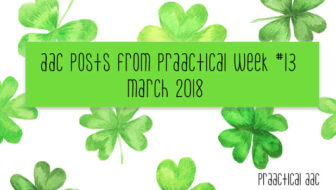
Missed some of our AAC posts from last week? Here’s what we were up to. Monday – PrAACtical Resources: Pragmatic Profile for People Who Use AAC Tuesday – AAC Link Up Wednesday – Video of the Week: Feature Matching for Apps Thursday – PrAACtical Alert: AAC App Discounts :::::::::::::::::::::::::::::::::::::::::::::::::::::::: Looking for some resources to use in your AAC work? Check out some of those listed below. AAC 101 Flipbook Communication Partner Data Collection Form AAC Skills: Caught or Taught? AAC Modeling Handout Repairing Communication Breakdowns
Filed under: PrAACtical Thinking
Tagged With: AAC modeling, communication repair, flipbook, partner skills, summary post
March 22, 2018
by Carole Zangari -
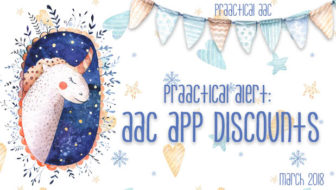
Lauren Enders does it again! We can always count on her for up-to-date information on the sales and discounts that get offered for Autism Awareness and Acceptance Month (April) and AAC Awareness Month (October). Check out this useful information. Note: The resources in this post will be updated with new information as it becomes available. Thank you, Lauren! ::::::::::::::::::::::::::::::::::::::::::::::::::::::: Looking to purchase an AAC or literacy app? It’s that time of year again! Don’t miss your chance to download select apps at a substantial discount in honor of Autism Acceptance/Awareness month. (Not all developers will be offering discounts.) Make sure you note specific sale dates for each app as they vary. Link to a PDF of this graphic for sharing: http://bit.ly/aacappsalegraphicmarchapril18 You can view or download a spreadsheet with sale dates and download links here http://bit.ly/aacappsalesmarchapril18 Reminder from my friend and respected colleague Rachael Langley: “Remember many of these programs... [Read More...]
Filed under: Featured Posts, PrAACtical Thinking
Tagged With: AAC apps
March 19, 2018
by Carole Zangari -
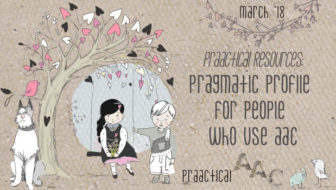
We’ve shared the Pragmatics Profile of Everyday Communication Skills in Children (by Hazel Dewart and Susie Summers) previously, and it remains a very useful tool. More recently, it has been adapted by Suzanne Martin, Katherine Small, and Rachel Stevens to focus specifically on people who use AAC. The Pragmatic Profile for People Who Use AAC is a welcome addition to our AAC assessment toolkit. Many thanks to the ACE Centre for their leadership and support in this area. :::::::::::::::::::::::::::::::::::::::::::::::::::::::::::::::::::::::::
Filed under: Featured Posts, PrAACtical Thinking
Tagged With: ACE Centre, assessment, pragmatics
March 15, 2018
by Carole Zangari -
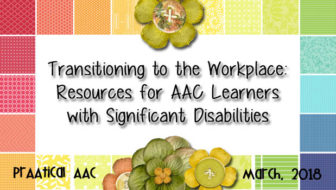
If we do our jobs well, students with AAC needs will leave school with a solid plan for post-secondary learning and/or the workplace. In most places, it can be challenging to identify meaningful work and learning experiences for young adults with AAC needs as they exit public education. While employment and educational opportunities for these young adults are slowly increasing, it is nonetheless a struggle to help young adults get prepared for their post-school lives. In this post, we share some resources that can help teams guide students and their families. QuickBook Of Transition Assessments (Cline, Halverson, Petersen, & Rohrbach, 2005) Reading-Free Vocational Interest Inventory–Second Edition (R-FVII:2) (Becker, 2000) Choose and Take Action Vocational Assessment Software (Martin, Marshall, Wray, Wells, O’Brien, Olvey, & Johnson, 2004) Self-Directed Employment: A Handbook for Transition Teachers and Employment Specialists, (Martin, Mithaug, Oliphint, Husch, & Frazier, 2002): May be out of print but available in... [Read More...]
Filed under: Featured Posts, PrAACtical Thinking
Tagged With: transition, vocational planniing, work
March 12, 2018
by Carole Zangari -
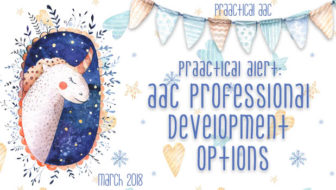
Lauren Enders, an amazing AAC SLP from Pennsylvania, graciously shared this list of professional development opportunities that may be of interest. Lauren works as an Augmentative Communication/Assistive Technology Consultant for Bucks County Intermediate Unit #22. In the list below, she shares resources for AAC learning in both online and face-to-face formats. Enjoy! You can see more of Lauren’s guest posts here. PROFESSIONAL DEVELOPMENT OPTIONS FOR AAC IMPLEMENTATION ONLINE SELF-DIRECTED LEARNING OPTIONS: Power AAC modules: a FREE training series developed by The Pennsylvania Training and Technical Assistance Network (PaTTAN)with Gail Van Tatenhove, CCC-SLP. This series of brief modules can be used for professional development by individuals or groups who are supporting students with complex communication needs and who need or use AAC. The POWER AAC modules are intended to build the capacity of school personnel to improve communication skills and provide flexible, generative vocabulary for students who need or use AAC. AAC Institute... [Read More...]
Filed under: Featured Posts, PrAACtical Thinking
Tagged With: Lauren Enders, lifelong learning, professional development
March 8, 2018
by Carole Zangari -
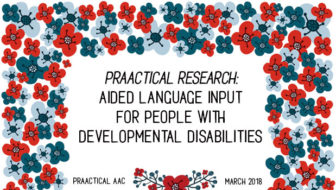
We’re pleased to welcome back Dr. Kathy Howery for another analysis of an AAC research article. Kathy is based in Alberta, Canada, and has worked in the field of AT and special education for over three decades. In the past year, she completed her doctoral studies where she used phenomenological methods to seek to understand the lived experience of speaking with/through a speech generating device. Kathy is currently working as a consultant to schools and school districts across Alberta focusing primarily on children and youth with complex communication needs. ::::::::::::::::::::::::::::::::::::::::::::::::::::::; Allen, A. A., Schlosser, R. W., Brock, K. L., & Shane, H. C. (2017). The effectiveness of aided augmented input techniques for persons with developmental disabilities: A systematic review. Augmentative and Alternative Communication, 33, 149-159. What this Article is All About (The Focus of the Research) This article presents the results of a systematic review of the research into what the authors refer... [Read More...]
Filed under: Featured Posts, PrAACtical Thinking
Tagged With: aided language input, augmented input, Kathy Howery, research
March 5, 2018
by Carole Zangari -
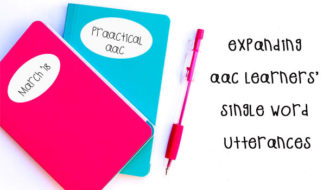
Know any learners like these? Jacob takes his teacher over to the snack cupboard and uses his SGD to say ‘cracker.’ Mara watches her friend throw a book and signs ‘angry.’ Elisheva finishes her drink and uses a communication book to say ‘more’ Some AAC learners linger at the single word level for far longer than they need to. One of the strategies that we use to help them move forward is to expand on their utterance and build on their word to model a 2-word sentence. ‘Cracker’ becomes ‘Want cracker.’ ‘Angry’ is built into ‘Shoshana’s angry.’ ‘More’ turns into ‘more milk.’ Sounds simple, right? Well, the concept certainly is, but it’s easy to get stuck or draw a blank when trying to do these sorts of expansions in therapy sessions, classroom activities, or daily routines. If you find your team forgetting to expand the learners’ single word utterances, some examples... [Read More...]
Filed under: Featured Posts, PrAACtical Thinking
Tagged With: expansions, language intervention
March 1, 2018
by Carole Zangari -
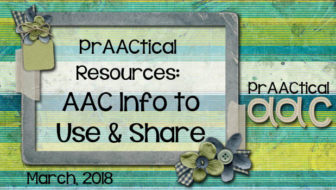
Looking for information on alternative access for kids with significant motor limitations? Need a basic overview of communication and AAC for a para, parent, or colleague? Wanting to explore a variety of AAC resources? Check out the resources below. Working with Nonverbal Students with Autism: This was written by Susan Stokes under a contract with CESA 7 and funded by a discretionary grant from the Wisconsin Department of Public Instruction. AAC Basics from Louisiana Assistive Technology Initiative’s AT Answers Indirect Access by Justin Sims Enjoy!
Filed under: Featured Posts, PrAACtical Thinking
Tagged With: access, ASD
February 26, 2018
by Carole Zangari -
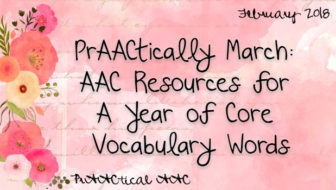
Do the AAC users in your life use only a fraction of the core words in their SGD, AAC app, or communication board? One way to help them move forward is to make a concerted effort to use, highlight, and provide additional teaching on a variety of words. It’s hard to do this without getting overwhelmed, so find a strategy that works for you. A few years ago, we decided to approach this by focusing on 12-16 core words each month. (If this is too much for the teams with whom you work, that’s not a problem. Just cut it back to 4-6 words/month.) Each month, we can highlight those words in our conversation (aided language input), direct intervention, and home programming activities with AAC learners. The repeated experiences with those 12-16 (or 4-6) words helps our AAC learners develop new skills, and keeps the team focused on the same destination. It’s... [Read More...]
Filed under: Featured Posts, PrAACtical Thinking
February 22, 2018
by Carole Zangari -

Words for emotions and feelings are pretty common in AAC devices and non-electronic communication aids, like PODD books and eye gaze boards. It’s wonderful when our clients can tell us they are sad or angry with words rather than using challenging behaviors or suffering in silence. What can we do to further their skills in this area? Here are some suggestions to get us thinking. Beyond the Basics: Consider going beyond the basic feeling words (i.e., happy, sad, mad, tired, scared) and including additional emotion words in the AAC system (e.g., frustrated, embarrassed, disappointed, lonely, worried). Don’t assume that this is inappropriate just because an individual has lower language levels or cognitive delays. To learn language, we have to have access to it. Model, model, model: Use these emotion words throughout the day to express your own feelings, and narrate your observations of how others are feeling (e.g., “Joey’s crying... [Read More...]
Filed under: Featured Posts, PrAACtical Thinking
Tagged With: emotions, feelings, visual supports









